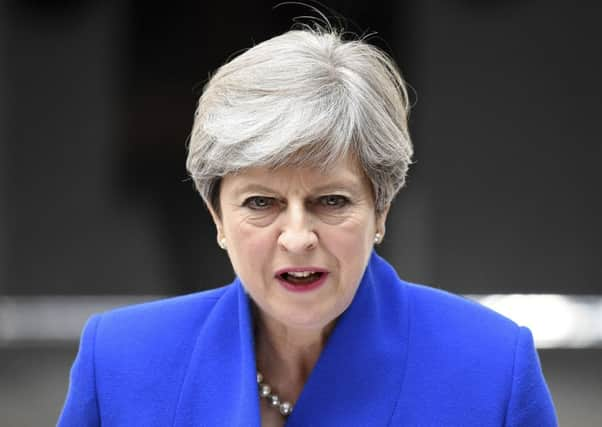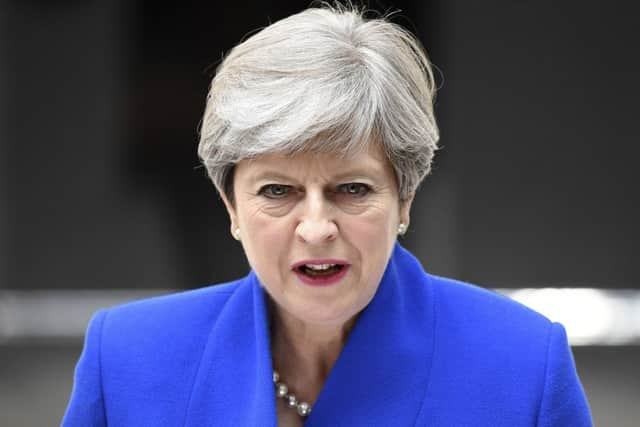Theresa May claims only Tories can offer '˜certainty'


Speaking after her return from a 20-minute audience with the Queen, Mrs May said: “What the country needs more than ever is certainty, and having secured the largest number of votes and the greatest number of seats in the General Election, it is clear that only the Conservative and Unionist Party has the legitimacy and ability to provide that certainty by commanding a majority in the House of Commons.
“As we do, we will continue to work with our friends and allies in the Democratic Unionist Party in particular. Our two parties have enjoyed a strong relationship over many years, and this gives me the confidence to believe that we will be able to work together in the interests of the whole United Kingdom.
Advertisement
Hide AdAdvertisement
Hide Ad

“This will allow us to come together as a country and channel our energies towards a successful Brexit deal that works for everyone in this country, securing a new partnership with the EU which guarantees our long-term prosperity.
“That’s what people voted for last June. That’s what we will deliver. Now let’s get to work.”
It is not thought that the PM has offered a full coalition with the DUP, which was catapulted into the role of kingmaker after increasing its representation at Westminster by two to 10 MPs.


Shortly before Mrs May’s statement, senior Unionist MP Sir Jeffrey Donaldson said it was “much too early” to talk of a formal agreement with a minority Conservative government.
In a humiliating night for the Prime Minister, Mrs May saw Tory ranks at Westminster reduced from 330 to 318 - with one constituency left to declare - while eight ministers were culled from the Government’s front benches.
Among the victims was Cabinet Office minister Ben Gummer, the author of the Conservatives’ widely-criticised manifesto.
Meanwhile, Labour - which had been written off by critics as all but unelectable - surged to 261 seats, up 29 from its tally in the 2015 election.
Liberal Democrats gained four seats to amass 12 MPs, but lost their former leader and ex-deputy prime minister Nick Clegg in perhaps the highest-profile casualty in a night of stunning results.
Advertisement
Hide AdAdvertisement
Hide AdMeanwhile, the Scottish National Party retained just 35 of the 56 seats it secured two years ago, and lost its Westminster leader, Angus Robertson, and former first minister, Alex Salmond.
And Ukip leader Paul Nuttall fell on his sword after just six months in the job, after slumping to a distant third place in Skegness & Boston on a woeful night for the Eurosceptic party, which shed swathes of voters to Labour and Conservatives.
Mr Corbyn said it was clear Labour had won the election and indicated he was ready to put forward a programme for government in an alternative Queen’s Speech.
“I think it’s pretty clear who won this election,” he said at Labour’s headquarters in central London.
“We are ready to do everything we can to put our programme into operation; there isn’t a parliamentary majority for anybody at the present time, the party that has lost in this election is the Conservative Party, the arguments the Conservative Party put forward in this election have lost.
“I think we need a change.”
The Prime Minister’s situation appeared precarious as Conservative former minister Anna Soubry said she should “consider her position” and take personal responsibility for a “dreadful” campaign and a “deeply flawed” manifesto after choosing to go to the country three years early in the hope of extending her majority.
But another prominent internal critic, former education secretary Nicky Morgan, said Mrs May should “carry on” and was “entitled” to see whether she can form an administration.
Brexit Secretary David Davis said he would “fight tooth and nail” to keep Mrs May in post, and dismissed suggestions that he might be a contender to replace her.
Advertisement
Hide AdAdvertisement
Hide Ad“The simple truth is we have a Prime Minister, she is a very good leader, I’m a big supporter of hers,” Mr Davis told the Press Association.
Foreign Secretary Boris Johnson, often tipped as a potential successor to Mrs May as Tory leader, said: “We’ve got to listen to our constituents and listen to their concerns.”
Liberal Democrats were celebrating the return of former ministers Sir Vince Cable, Sir Ed Davey and Jo Swinson two years after they lost their parliamentary seats.
Leader Tim Farron held on to his Westmorland and Lonsdale seat in Cumbria on a much-reduced majority, down from 8,949 in 2015 to just 777 now.
